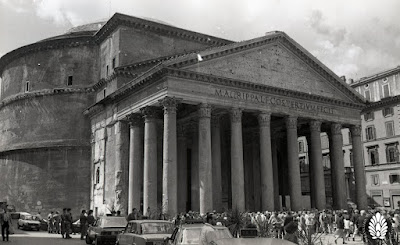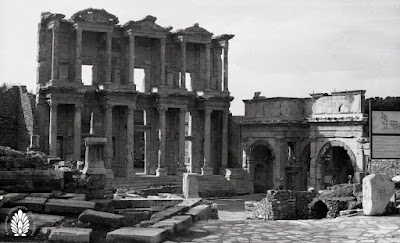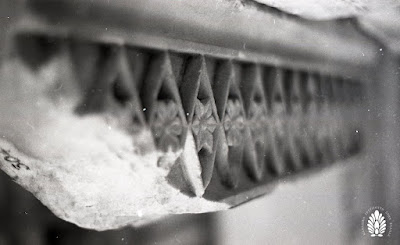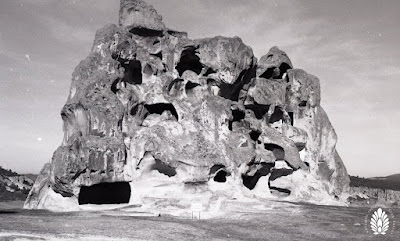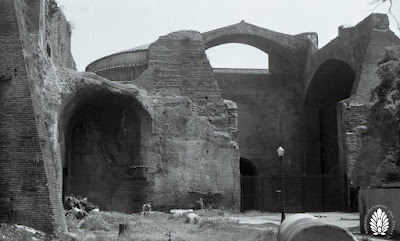Tuesday, December 29, 2020
Tuesday, December 22, 2020
The Fred Winter Collection
Friday, December 18, 2020
Internship During A Worldwide Pandemic
I was also able to travel around Athens quite a bit to try out many of the different cuisines the city has to offer. From traditional Greek food, to Asian, Indian, and even American-style restaurants are in abundance throughout the city. My favorites though, were the little cafes, where you could get a cappuccino and a bite of cake and sit on the patio in the sun.
Work at the institute went along smoothly with the move to new premises. For the first month and a bit I packed up all the books and belongings from the institute on Aiginitou Street, and then when the move was complete at the end of October, I began to unpack and arrange everything in the new building. I’m happy that I got to be a part of the moving process, because this is an exciting time for the CIG. The new building is a huge upgrade, and when lectures start occurring again, is going to be a wonderful place for academia to gather.I wish that I had been able to stay longer, because I really enjoyed my work at the CIG and living in Athens. It opened up a new aspect of archaeology that I wasn’t aware existed. I came to Greece, very excited and not really sure what to expect. In the end I met so many wonderful people and was able to fully immerse myself in the culture. I’m truly grateful that this opportunity was given to me.Christine Sylvester
Wilfrid Laurier Intern, Fall 2020
Tuesday, December 15, 2020
Tuesday, December 8, 2020
Friday, December 4, 2020
We Have Moved!
We are delighted to announce that the Canadian Institute in Greece has relocated to its new premises at Orminiou 3 (close to the Hilton Hotel), purchased in 2017 and now newly renovated. This marks an important step in the Institute’s expansion and visibility in Greece.
The three-storey, historically significant building and prime example of 1930s Athens architecture was the residence of the well-known writer, artist and art critic, Stratis Doukas, from 1938 until 1981.
Since its founding in 1974, the Canadian Institute’s key objective has been to promote Canadian research and education in fields relating to Greece’s heritage, including significant archaeological fieldwork and scientific study. Throughout the years, the Institute has had to expand several times in order to meet growing needs. By relocating to its spacious new premises, the Institute will now be able to further enhance its contribution to Greek archaeology and expand its activities to include arts and culture, by presenting the work of Canadian artists and promoting collaboration between Canadian and Greek cultural communities.We look forward to the opportunity of welcoming you to our new home, as soon as circumstances allow.
Jonathan Tomlinson
Assistant Director
Tuesday, December 1, 2020
Tuesday, November 24, 2020
Tuesday, November 17, 2020
Tuesday, November 10, 2020
Tuesday, November 3, 2020
Tuesday, October 27, 2020
Tuesday, October 20, 2020
Tuesday, October 13, 2020
Tuesday, October 6, 2020
Friday, October 2, 2020
Welcome, Laure!
On Monday, the Institute’s Elisabeth Alföldi-Rosenbaum Fellow for the 2020-2021 academic year, Laure Sarah Ethier, arrived in Athens. Ms. Ethier had been carrying out research in northern Greece since the start of her Fellowship in early September.
Laure is a PhD candidate in History at the University of Montreal, under the supervision of the Institute’s Director, Professor Jacques Y. Perreault. Her thesis, entitled “Argilos, de la conquête macédonienne à sa dernière phase d’occupation: une citée en mutation”, consists of an archaeological and historical study of the city of Argilos in northern Greece, from 357 BC (date of conquest of the city by Philip II), until its final abandonment, which has been dated to the second century BC.
Following the Macedonian conquest, it is generally accepted that the site was abandoned and its inhabitants moved to Amphipolis. Only the Acropolis remained inhabited, evidenced by the construction of a large agrarian-style mansion, containing a remarkable olive press. Most likely granted by Philip II to one of his trusted companions (hetairoi) as a reward, this land donation would have served above all to ensure loyalty and control of the kingdom in the absence of its king. Despite the overall outline of the history of Argilos being known today, this phase of occupation of the site and the associated archaeological material have never been the subject of an exhaustive study and still raise many questions.
While in Greece this year, Ms. Ethier wishes, first, to answer questions relating to the duration of the reoccupation of the site after its conquest and the reasons justifying its definitive abandonment. And, second, to highlight the economic and political dynamics and the role of Argilos in the network of communication and exchange during the Hellenistic period. In order to accomplish these objectives, a study of the rich Hellenistic archaeological material of Argilos will be carried out. This project will help fill several gaps in our knowledge of the history of Argilos and the entire Lower Strymon region in the years following the conquest of Philip II.
Jonathan Tomlinson
Assistant Director
Tuesday, September 29, 2020
The Fred Winter Collection
Tuesday, September 22, 2020
The Fred Winter Collection
Friday, September 18, 2020
Welcome, Christine!
Last Monday we welcomed a new intern from Canada, Christine Sylvester. COVID-19 permitting, Christine will stay with us in Athens until early December. She is currently packing our library systematically into boxes in readiness for the Institute’s move to new premises next month. (More on that in an upcoming blog!)
Christine is an undergraduate student in her fourth year at Wilfrid Laurier University. She is majoring in Archaeology and Heritage Studies as well as History, and planning to continue her archaeological studies to graduate level.
Through Christine’s studies and opportunities to participate in archaeological excavations, she has formed an interest focusing on ancient civilizations and their cultures, specifically those of the Classical world. Though undecided on what to pursue as a graduate, she wants to explore the culturally diverse classical world and how different sociocultural factors are reflected in the osteological record.
By being given the opportunity to work as an intern at the Canadian Institute in Greece, Christine hopes this in-person experience will both help her understand the Greek culture more fully, as well as give her a better idea of different academic and career paths to take within the archaeological community.
Jonathan Tomlinson
Assistant Director









